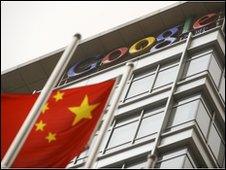Q&A: Google and China
- Published

Google China headquarters in Beijing
Google has announced that the Chinese government has renewed its licence to operate in the country, closing the latest chapter in a long-running saga between the two.
What's the background?
The US technology giant and Chinese authorities have repeatedly clashed over the issue of internet freedom.
Tensions flared between the two in January 2010 after a number of Gmail accounts belonging to Chinese human rights activists were hacked.
Although Google did not make a direct accusation against the Chinese government, it said it would no longer censor its search results, even if that resulted in its China operation coming to an end.
It started automatically redirecting Google.cn users to Google's search site in Hong Kong, so that Google was not filtering out, or "self-censoring" results that the Chinese authorities objected to.
On 30 June, Google announced a "new approach", saying users in mainland China would have to actively click on a link before accessing an unfiltered search engine.
So Google China started redirecting users to Hong Kong. Isn't that in China?
Yes it is, but it - and the province of Macau - are special self-governing administrative regions, set up as a result of their handover from the United Kingdom and Portugal respectively, with their own laws.
Hong Kong is highly dependent on the financial markets and city workers need rapid access to information to enable them to keep pace with world events. A restriction on that flow of information might drive them - and a substantial amount of money - out of the area.
Google.com.hk does not censor search results; however while internet users in mainland China can see unrestricted search results, clicking a link takes them through the so-called "Great Firewall of China", meaning the results of a search for a restricted term are blocked.
So what was the difference?

Google China now requires users click before redirecting to Hong Kong
It was a small but subtle change. Up until then, users were automatically referred from the Google.cn website to Google.com.hk. From June users made an "active choice" i.e. clicking a link before changing sites.
The thinking was that Google was no longer automatically getting users round the internet filtering and the onus lay instead with the user, not the US search engine, in making that choice to bypass government internet restrictions.
So what has happened to Google China then?
Google has effectively mothballed the Google.cn domain. Its only function now is a referral page (with an active link) to Google.com.hk
So how did China react?
Google's licence renewal was due on 30 June, and the country remained silent on the topic for more than a week.
Despite earlier speculation that the Chinese authorities might revoke Google's licence entirely, the search engine said on 9 July that its licence had been renewed.
China had condemned Google's move , externalin March, saying its attempt to get round China's censorship laws was "totally wrong" and broke a promise the company made when it set up in the country.

Tiananmen square + Tank are on the proscribed list of search terms.
What is the background to Chinese censorship?
Internet regulation in China started in 1993 and has grown since then. Today there are over 60 different laws governing what can (and cannot) be viewed on the net.
By the time Google China was founded in 2005, the laws controlling internet freedoms were very tight; the firm subsequently launched its Google.cn search page with censored results.
China is not the only country to have restrictions on its search results and Google has a history of complying with national laws on language specific sites.
Google.de in Germany does not return results that conflict with national laws governing information about the Nazis, for example.
However, in almost every other country, users can log onto Google.com which has unfiltered results.
The problem they had in China was that the Google.com domain is blocked, meaning users could only use the Google.cn search page.
Why did Google agree to censor results in the first place?
It was a controversial topic: critics said it was a direct breach of the search firm's motto of "Don't Be Evil".
Google claimed that it would have more influence on internet freedoms inside the country than out.
In a statement the firm said "While removing search results , externalis inconsistent with Google's mission, providing no information... is more inconsistent with our mission."
What about other Western net firms in China?
No other net firm has taken the same action as Google. Yahoo, Microsoft and many others still operate on mainland China. They filter search results and censor the blogs and discussions carried out on their services.

Google will maintain a presence in China but this may well slim down
In the past some firms have passed information to the Chinese authorities that has helped them track down dissidents.
In February 2008 hi-tech firms such as Facebook, Apple, and Amazon, gave a pledge to balance human rights with official calls to filter results. The US government is looking into how well that initiative has been working.
Who are Google's rivals in China?
Baidu is one of China's largest search engines and actively censors its content, complying with Chinese legislation. Microsoft is also waiting in the wings, with the firms CEO - Steve Ballmer - saying the firm has no plans, external to pull out of China.